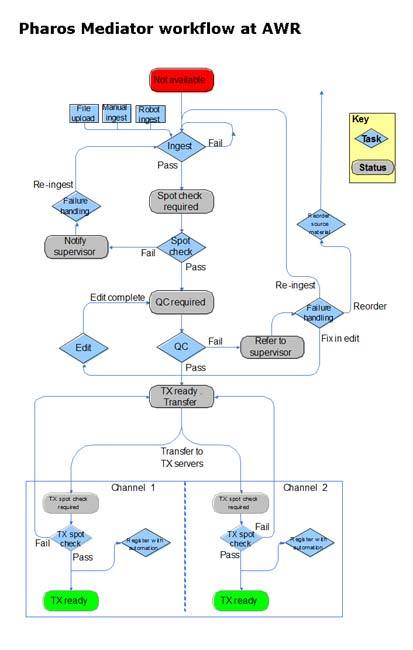Page 1 of 2
Choosing a global content production provider over several platforms
Adventist World Radio is the international broadcast ministry of the Seventh-day Adventist Church. One of its main objectives is to explain Christian ethics of mutual understanding and charity to more than four billion people living in the 72 countries between 10 and 40 degrees north latitude, a region spanning North Africa, the Middle East, and a large portion of Asia/Pacific. AWR and its affiliates broadcast over 1,000 hours of audio content each week in more than 80 languages, relayed from 10 transmission sites in Africa, Asia, Europe, and the Americas.
AWR's headquarters in Maryland, USA, are augmented by production studios located in or near the regions they address. programmes are delivered with a potential outreach of 80 per cent of the world's population through shortwave and local AM/FM radio; listeners worldwide can access all programmes online. Content is unique to each country or region. In addition to religious subjects, topics covered include medical advice, discussions on family matters, and musical presentations.
After careful comparison of available media asset management systems, AWR has selected Pharos to provide a global content production and distribution solution using the Mediator content management and workflow platform. Pharos Mediator gives AWR the resources it needs to handle its current AM, FM, shortwave and satellite radio operation and to offer its programmes as internet-based audio-on-demand podcasts.
Podcasting
AWR had been experimenting with internet-based podcasting for several years as an extension of its radio activity. programmes were initially created as WAV files and compressed to MP3 before being transferred via File Transfer Protocol to the programme director who then manually opened and edited each file in Adobe Audition. Some studios have no internet connectivity and in their case an entire month's content is despatched to the playout hub on CD. With over 100 one-hour files arriving each day, this process involved a great deal of manual intervention. Content processing proved so labour-intensive that only about 10 of the 75 languages transmitted by radio could be handled.
Plug-and-play
A complete Mediator system was assembled and pre-configured by Pharos in Reading before being transported to AWR's UK headquarters. Installation, essentially plug-and-play, was performed by AWR technical and operational staff.
Mediator's browser-based user interface gives AWR staff all the facilities they need to oversee content production and publishing from anywhere in the world, including managing file transfers based on predetermined broadcast schedules. These programmes are listed in popular podcasting services such as Apple iTunes to maximise awareness of AWR content rather than being limited to visitors to the AWR web site. Podcasts can also be syndicated via Mediator through third-party web sites, blogs, and social networking sites.
The system delivers six key benefits:
* Global programme syndication and content validation enable AWR to offer its programmes as internet-delivered podcasts.
* Pharos Mediator greatly increases audience-accessibility to AWR content, making each programme available worldwide as soon as completed rather than having to be held in a transmission queue.
* Mediator integrates AWR's entire global content production and distribution network using the Amazon cloud infrastructure. programme content can be uploaded from regional studios and producers, some of whom operate in locations with restricted social and transport infrastructure.
* Pharos Mediator is capable of processing hundreds of programmes each day, transcoding as required using Rhozet's Carbon Coder.
* The Pharos installation is expandable to handle future audio and video distribution platforms as they are developed.
* The Amazon charge system is based on actual traffic supported by precise statistics which are appreciated by the philanthropists who fund AWR. This is much more precise that with radio where the only statistics available are the number of letters sent by readers in response to a specific programme.

